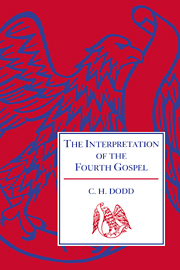Book contents
- Frontmatter
- Contents
- PART I THE BACKGROUND
- PART II LEADING IDEAS
- 1 Symbolism
- 2 Eternal life
- 3 Knowledge of God
- 4 Truth
- 5 Faith
- 6 Union with God
- 7 Light, Glory, Judgment
- 8 Spirit
- 9 Messiah
- 10 Son of Man
- 11 Son of God
- 12 Logos
- PART III ARGUMENT AND STRUCTURE
- APPENDIX: Some considerations upon the historical aspect of the Fourth Gospel
- Index Locorum
- Index Nominum
8 - Spirit
from PART II - LEADING IDEAS
Published online by Cambridge University Press: 10 December 2009
- Frontmatter
- Contents
- PART I THE BACKGROUND
- PART II LEADING IDEAS
- 1 Symbolism
- 2 Eternal life
- 3 Knowledge of God
- 4 Truth
- 5 Faith
- 6 Union with God
- 7 Light, Glory, Judgment
- 8 Spirit
- 9 Messiah
- 10 Son of Man
- 11 Son of God
- 12 Logos
- PART III ARGUMENT AND STRUCTURE
- APPENDIX: Some considerations upon the historical aspect of the Fourth Gospel
- Index Locorum
- Index Nominum
Summary
The term πνεμα is conventionally defined as ήρ κινōμενō (cf. Philo, Quod Det. 83). It is thus applied primarily to the wind (cf. Plato, Definitiones, πνεμα kiνησι aρō περì τήν γijν), and to the breath of living beings, both of which are examples of air in motion. From these two fundamental meanings two main lines of usage derive, the one metaphysical, the other psychological (or physio-psychological).
To take the latter first, from an early period πνεμα stands along with ψνχή) for the ‘breath-soul’, that invisible factor in the human being which seems to be inseparable from the function of breathing, and in default of which the man ceases to live. The distinction, and the relation, between πνεμα and ψγχή are differently stated by different schools of thought. The influential Stoic school defined the ψγχή) as πνεvtilda;μα νϘεμρōν. Others distinguished the two in various ways, which do not especially concern us.
Of more immediate importance is the metaphysical development. The impression of movement and force which the mind derives from contemplating the effects of wind seems early to have suggested that life and movement in the world of nature are due to the presence of some element analogous to the breath-soul in man. The Pythagoreans spoke of an πειρōν πνεμα encompassing the universe, which the world breathes in (dναπνε), or of ‘one πνεμα pervading the whole universe like a ψγχή, which also unites us with other living things’.
- Type
- Chapter
- Information
- The Interpretation of the Fourth Gospel , pp. 213 - 227Publisher: Cambridge University PressPrint publication year: 1953

